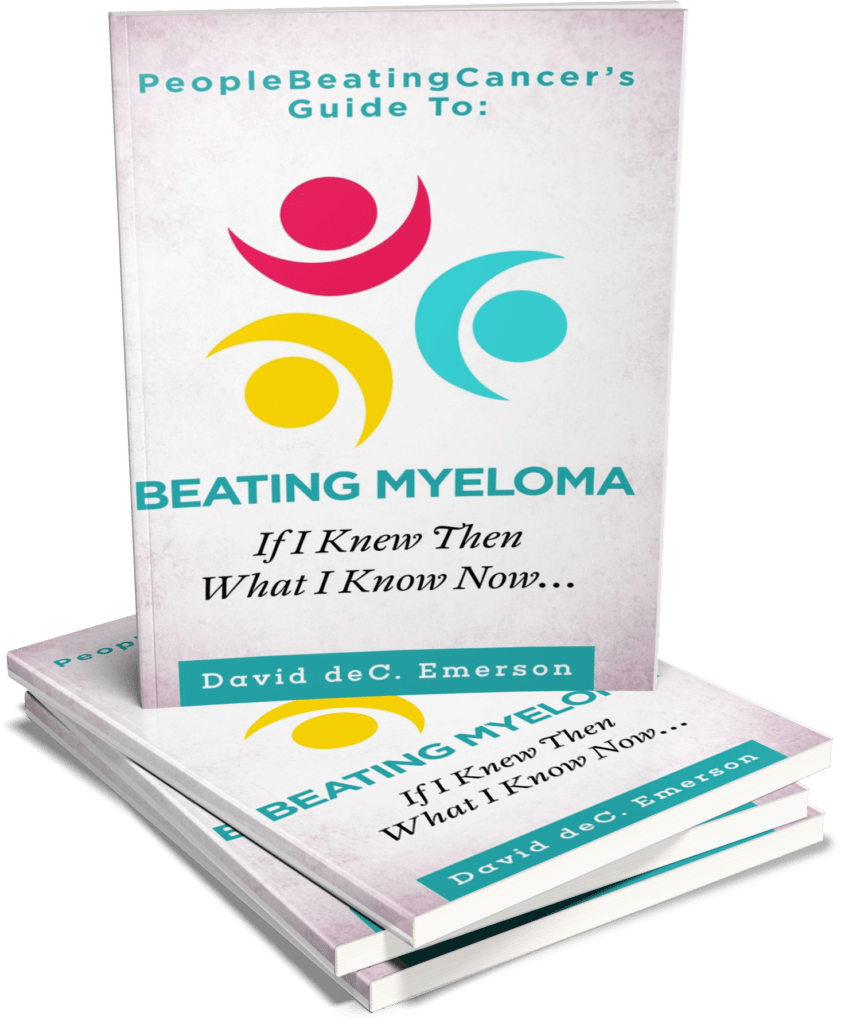
Recently Diagnosed or Relapsed? Stop Looking For a Miracle Cure, and Use Evidence-Based Therapies To Enhance Your Treatment and Prolong Your Remission
Multiple Myeloma an incurable disease, but I have spent the last 25 years in remission using a blend of conventional oncology and evidence-based nutrition, supplementation, and lifestyle therapies from peer-reviewed studies that your oncologist probably hasn't told you about.
Click the orange button to the right to learn more about what you can start doing today.
- You are here:
- Home »
- Blog »
- Multiple Myeloma »
- Myeloma Stem Cell Transplant- Vaccination Post Transplant? Yes or no?
Myeloma Stem Cell Transplant- Vaccination Post Transplant? Yes or no?

“This review will focus on the need for appropriate timing of specific vaccination in two adult oncology populations: (MM patients) those who are receiving chemotherapy and those who have undergone stem cell transplant.”
One of the most frequent questions I hear from multiple myeloma (MM) patients who have undergone a stem cell transplant (auto or allo) is “I just had a myeloma stem cell transplant. Should I be vaccinated?” This question usually occurs relative to the annual flu season. But the article linked and excerpted below offers recommendations about vaccinations for a host of diseases.
I’ve been living in CR from my MM since early 1994. I underwent a HSCT in 12/95. I don’t eat raw fish but I do eat raw fruit and veggies. I’m not sure why I treat these raw foods differently…
After reading the article below, all I could think of was that none of this has ever been discussed with me by my oncologists. None of it.
That being said, most of us MM patients understand that a MM stem cell transplant wipes out our immune systems. Or as the article below says, it is if we were “never vaccinated.”
And I can’t forget the fact that I had a shingles outbreak about two months post HSCT. Shingles is the herpes zoster virus.
It’s impossible for me to blog about the importance of MM patients being re-vaccinated post HSCT when I have not been re-vaccinated myself for any of the viruses listed below. Not to mention that I have never had a flu shot.
I can only recommend that MM patients read the info below carefully and decide what they think is best for them in their situations.
Are you a MM survivor? Post MM stem cell transplant? Do you get a flu shot annually? Did you re-vaccinate post HSCT? Scroll down the page, post a question or comment and I will reply to you ASAP.
Thank you,
David Emerson
- MM Survivor
- MM Cancer Coach
- Director PeopleBeatingCancer
Recommended Reading:
- Multiple Myeloma-Newly Diagnosed, Post SCT and Relapsed?
- Multiple Myeloma- “Gene Regulation” as Cancer Therapy?
- Stem Cell Transplants Increase Risk of Skin Cancers
Vaccination Recommendations for the Hematology and Oncology and Post–Stem Cell Transplant Populations
“The purpose of this review is to examine the need for each vaccine in two separate oncology populations: patients receiving concurrent chemotherapy and post–stem cell transplant patients. In addition, the importance of avoiding live vaccines and criteria for reconsideration at a future time will also be discussed…
In the oncology population, concurrent chemotherapy and immune reconstitution posttransplant are two factors that may alter the effectiveness of vaccinations as well as the recovery process of the immune system. As a result, the timing of vaccinations with respect to treatment may play a role in achieving extended immunity and better outcomes for oncology patients (Pollyea et al., 2010)…
This review will focus on the need for appropriate timing of specific vaccinations in two adult oncology populations: those who are receiving chemotherapy and those who have undergone stem cell transplantation…
In patients undergoing transplant, the loss of pretransplant immunity is inevitable. The degree of immunity loss may be dependent on several factors such as the strength of the existing immunity, the type of transplant, the source of the stem cells, the conditioning regimen used, the presence and severity of graft-vs.-host disease (GVHD), and the immunosuppression used (Ljungman et al., 2005)…
As a result of the delayed recovery, a fully functional immune system is not obtained until approximately 6 to 12 months post stem cell transplantation (Singhal & Mehta, 1999). Despite eventual recovery of the immune system, some posttransplant patients are viewed as “never vaccinated,” thereby requiring specific reimmunization for certain vaccines while avoiding others…
Influenza Vaccine-
In the Stem Cell Transplant (HSCT) population, it is recommended that vaccination with the inactivated influenza vaccine should take place no sooner than 6 months posttransplant but within the first year after transplant. A second dose, 1 month later, should be considered, especially if it is the first time the patient has ever been exposed to the influenza vaccine. Due to a compromised immune system posttransplant, live attenuated influenza is contraindicated in this population. It is also recommended that family members and caretakers also receive annual inactivated influenza vaccination if there is contact with those who are immunosuppressed (Ljungman et al., 2009)…
The observed side effects of the inactivated influenza vaccine are similar in all populations in that they are generally mild and may include soreness or pain around the injection site, fever, fatigue, or myalgia. These symptoms may occur 6 to 12 hours postinjection and generally last no longer than 2 days. In a rare case scenario Guillain-Barré Syndrome, a neurologic complication, may occur (Shoji & Kaji, 2003)…
Pneumococcal Vaccine-
While the incidence of severe pneumococcal infection accounts for a small portion of all pneumococcal infections, the mortality rate remains at approximately 7% (NFID, 2011)….
The pneumococcal vaccine is generally recommended for very young and very old individuals, and particularly for those who are immunosuppressed and asplenic…
In general, adult patients who are receiving chemotherapy treatment for both hematologic (with some exceptions) and oncologic conditions should receive the pneumococcal vaccine (PPSV23) 4 to 6 weeks (minimum 2 weeks) prior to starting chemotherapy; revaccination should occur once 5 years after the initial dose, then as recommended by vaccination guidelines (CDC, 2012; Arrowood, 2002). Due to a lower immunogenic response, patients receiving treatment for multiple myeloma, Hodgkin and non-Hodgkin lymphomas, and chronic graft-vs.-host disease (cGVHD)…should be vaccinated with PCV7 instead of PPSV23…
Diphtheria-Pertussis-Tetanus Vaccines-
For patients with hematologic and oncologic malignancies, Td is recommended once every 10 years; this is the same as the recommendation for the general public (CDC, 2012). It is extremely important for patients who are receiving chemotherapy to be updated with the tetanus-diphtheria vaccination…
Haemophilus influenzae Type B Conjugate Vaccine
In the HSCT population, a three-dose series beginning 6 months posttransplant, followed by a booster at 18 months posttransplant, is recommended (Hilgendorf et al., 2011; Ljungman et al., 2009). The response to postvaccination antibody level is augmented if HSCT recipients received donor-immunized hematopoietic stem cells as opposed to nonimmunized stem cells (Molrine et al., 1996). As such, it is extremely important that the donor receive up-to-date vaccination prior to stem cell collection while the recipient receives a series of appropriate vaccinations posttransplant…
Hepatitis B Vaccine-
While its incidence remains low, patients undergoing chemotherapy with or without HSCT may have the potential to contract HBV infection through blood transfusions. But in today’s practice, blood products routinely undergo a series of rigorous testing for the detection of potential infection that could be transferred to the recipient. At the instance when the patient is most vulnerable—when the immune system is suppressed— the likelihood of contracting an acute HBV infection, as well as the potential for reactivating chronic liver infections, is increased…
Hepatitis A Vaccine-
The incidence of hepatitis A infection is highest in underdeveloped countries and in areas of (or individuals with) poor hygiene practice. Vaccination plays a major role in preventing hepatitis A infection; its protective effects can last for more than 20 years. In healthy patients, two doses of hepatitis A vaccine will induce protection in up to 99% of recipients (CDC, 1999)…
Polio Vaccine-
In patients with hematologic and oncologic malignancies, revaccination with IPV is not necessary unless antibody titer is below detectable levels, in which case revaccination is recommended prior to chemotherapy…
Meningococcal Vaccine-
In post-HSCT patients, vaccination with the conjugated meningococcal vaccine starting 6 to 12 months posttransplant may be considered if the likelihood of contracting Neisseria meningitides is high…
Human Papillomavirus Vaccine-
In the oncology population, it is optional, if age appropriate…
Measles-Mumps-Rubella Vaccine-
Unlike patients who receive chemotherapy without stem cell transplant, post-HSCT patients will experience in a decrease in and eventually a loss of MMR immunity from most previous vaccination within the first few months after transplant. Although vaccination with live attenuated MMR vaccine is generally not recommended immediately post-HSCT, it should be reconsidered at least 2 years posttransplant. Patients should be free from chronic GVHD and off immunosuppression at the time of revaccination…
Varicella Vaccine-
Chickenpox appearing late in life is a reactivation of the VZV, otherwise known as shingles. In addition to proper hygiene, vaccination plays a role in providing protection (CDC, 2012)…
Live Vaccines-
In general, live vaccines (MMR, varicella, and intranasal influenza) should be avoided in patients undergoing concurrent chemotherapy and posttransplant patients. The timing and method of protection differs between these two populations…
Conclusion-
In most cases, many post-HSCT patients are viewed as “never vaccinated.” These individuals are recommended to be revaccinated with certain vaccines, while some are optional and others should be avoided (see Table 6)…”



